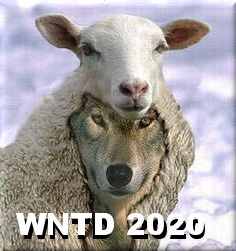
World No Tobacco Day: nicotine-skinned wolves
 Today, May 31 is World No Tobacco Day (#WNTD). Established in 1987 by World Health Assembly Resolution WHA40.38, until now, never has any prior WNTD mentioned the real culprit, nicotine.
Today, May 31 is World No Tobacco Day (#WNTD). Established in 1987 by World Health Assembly Resolution WHA40.38, until now, never has any prior WNTD mentioned the real culprit, nicotine.
The 2020 WNTD theme is "Protecting youth from industry manipulation and preventing them from tobacco and nicotine use."
Manipulation is about control by artful or unfair means, especially to one's own advantage. One aspect of industry control that’s gone totally unnoticed is how youth core nicotine beliefs were formed.
January 13, 1984 is a day that lives in cessation infamy, what may have been the greatest corruption of science ever. It’s the day the U.S. Food and Drug Administration (FDA) approved the sale of Nicorette nicotine gum.
The foundation for the FDA’s decision was the June 22, 1983 meeting, discussion and vote of the FDA’s Drug Abuse Advisory Committee. What leaps from the meeting's 132 page transcript is that the foundation science underpinning nicotine replacement therapy (NRT) was a mess and junk from the beginning.
During the 36 years and hundreds of sham placebo-controlled NRT studies since, the child and adolescent subconscious has been relentlessly bombarded by NRT study headlines and marketing asserting that nicotine is safe, that it’s medicine, therapeutic, and that it doubles your chances of success.
How could our kids not have felt safe while Juuling? And one approval mistake led to another.
The 2009 passage of the Family Smoking Prevention and Tobacco Control Act opened the door to Congress transferring primary nicotine industry oversight from the Federal Trade Commission to the FDA.
There, jurisdiction over tobacco and nicotine has corrupted the single-mindedness of an agency that was hell-bent on preventing a single death. With the stroke of a pen, the FDA was handed regulatory responsibility for the more than 6 million nicotine dependency related deaths since.
And how has the Act’s intent in protecting children from industry manipulation worked-out?
A decade later, menthol is still used to numb smoke’s harshness in hooking kids. We’re the last developed nation on earth without graphic health warnings pictured on each cigarette pack.
And there are still no visible point-of-sale signs warning gullible teens, curious about the multitude of brightly colored cigarette packs forming the store’s tobacco power-wall, that "Nicotine is Highly Addictive."
Back to this year's WNTD nicotine industry youth manipulation theme, is it fair to lump NRT pharmaceutical company manipulation with that of tobacco companies?
Let me ask this. If NRT truly was medicine, therapy and effective, with half of smokers smoking themselves to death, what would be the most compelling reason for smokers to give it a try? That smoking kills?
Try to think of any NRT, Zyban or Chantix commercial in history that has ever mentioned that smoking is bad for you. You can’t do it, can you? But why?
Once secret tobacco industry documents suggest that shortly after the birth of Nicorette, that conflicts between Big Tobacco and Big Pharma resulted in an implied operating agreement.
They relied upon many of the same suppliers for raw materials, including tobacco. They were dependent upon the same population in generating profits. While one markets rationalizations supporting lifetime nicotine dependence, the other sells the Herculean task of weeks or months of gradual nicotine weaning.
Why haven’t you ever seen a quitting product commercial that attacked smoking as unhealthy? Because under the agreement, neither could ever say anything negative about the other.
A 2002 study in the Journal of the American Medical Association concluded that "NRT appears no longer effective in increasing long-term successful cessation in California smokers." By 2004, Philip Morris USA was teaching smokers that buying and using NRT was a key to successful quitting.
In January, two decades of microscoping and megaphoning cessation study findings apparently struck a chord.
Page 15 of "Smoking Cessation: A Report of the Surgeon General" shares a link to Freedom from Nicotine: The Journey Home, my free online cessation e-book. There, under the heading "Perspectives on Smoking Cessation" the report states:
Proponents of encouraging smokers to quit without treatment, often called quitting "cold turkey," point to data indicating that most smokers who quit successfully do so without medications or any type of formal assistance, as well as to population surveys suggesting that cold-turkey quitters do as well or better than those who use over-the-counter NRTs.
At last, a senior U.S. health official had openly acknowledged the findings of scores of population-level cessation studies, that OTC NRT is ineffective, that NRT may be undercutting worldwide cessation and, if so, is costing lives.
If true, shouldn’t the foundation question be the raw consequences of 36 years of shouting that a toxin and natural insecticide is medicine, that its use is therapy?
If the vast majority addicted to nicotine continue to arrest their dependency by going cold turkey, why isn’t that news? Why zero study into the keys to successful abrupt nicotine cessation?
I, John R. Polito, am fully and solely responsible for the content of this article. Any factual error will be promptly corrected upon notice emailed to john@whyquit.com

